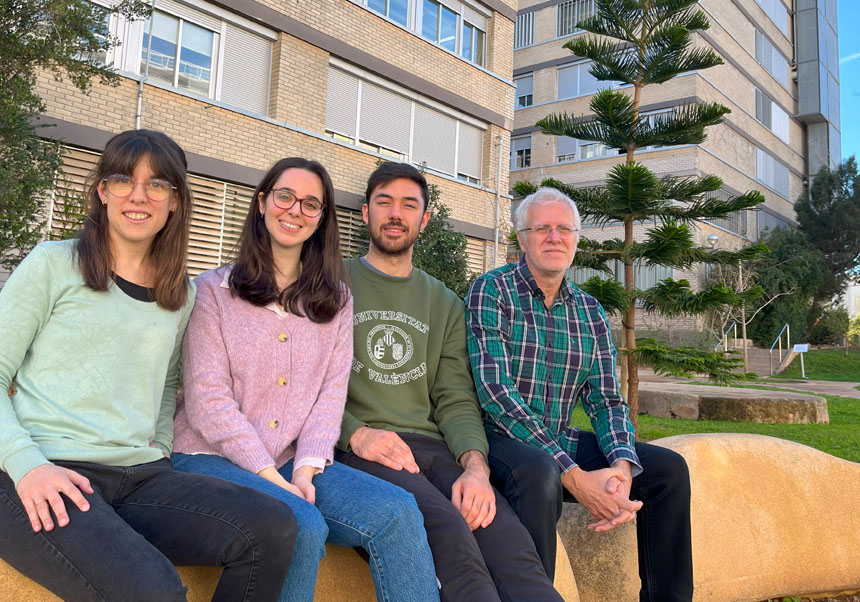
The Cell Cycle Regulation in Eukaryotes research group at the University of Valencia (UV) has discovered a new way to control cell division, a key process to understand diseases such as cancer, in which cell proliferation loses the correct operation of its control and braking mechanisms. The study, published in the journal EMBO Reports and carried out with the model organism S. cerevisiae (bread, wine and beer yeast), reveals that the Pho85 protein blocks the regulator Whi7 at the beginning of the cell cycle to promote proliferation.
The transition between G1 and S phases, known as Start in yeast or restriction point in mammals, is the most important control point of the cell cycle, since it is the moment in which cells make the irreversible decision to proliferate or not. To control this key point in division, cells have proteins that act as a brake, such as Whi7 and Whi5, which prevent genes necessary for cell proliferation from being expressed. Pho85 is a multifunctional protein that integrates the signalling of different stresses in the cell and is also involved in the regulation of the cell cycle. This work delves into the control of the Whi7 repressor and describes that the Pho85 protein inactivates it.
The Pho85 protein negatively regulates the Whi7 repressor through multiple levels: decreasing its gene expression, increasing protein instability, and blocking its repressive function on genes.
“Previous studies by our group proved that, while Whi5 acts as the main repressor of the cell cycle under normal conditions, Whi7 increases its role in conditions of damage to the cell wall. In this sense, we have seen that, in cells mutant in the Pho85 protein, which simulate stress conditions, Whi7 gains function to the point of being the main repressor of the cell cycle”, explains Cristina Ros, researcher at the Institute of Biotechnology and Biomedicine (BIOTECMED) and the Department of Biochemistry and Molecular Biology of the UV, as well as first author of the article.
This process has been studied in the simplest eukaryotic system: the budding yeast Saccharomyces cerevisiae. Even so, the ultimate objective is that the conclusions can be extrapolated to more complex systems, since the control of the cell cycle is a highly conserved process in yeast and mammals and its analysis is essential to understand and combat diseases such as cancer, in the that cell proliferation loses the correct functioning of its control and brake mechanisms. In this sense, mammalian cells also have homologs of the proteins Pho85 (CDK5) and Whi7 (the retinoblastoma family repressor proteins p107 and p130).
“The importance of this work lies in the fact that we have more information about the strategies that cells use to control the beginning of the cell cycle”, highlights Cristina Ros. Furthermore, “it points the way to understanding the mechanisms used when they are subjected to stress. The fact of having several layers of regulation of the Whi7 repressor by the Pho85 protein suggests the importance of the robustness of the control system of this repressor”, according to Cristina Ros. In the future, the stress conditions that affect the Pho85 protein will be investigated to give rise to the specific regulation and functional specialisation of Whi7 described.
In the article “The CDK Pho85 inhibits Whi7 Start repressor to promote cell cycle entry in budding yeast”, Cristina Ros Carrero, Mihai-Spiridon Bodi, Juan Carlos Igual and Mercè Gomar-Alba, members of the Cell Cycle group of the University of Valencia, participated.
The Cell Cycle group is part of the University Institute of Biotechnology and Biomedicine (BIOTECMED) of the UV. It carries out basic research in one of the areas of greatest interest in molecular and cellular biology, such as the control of the cell cycle. Over the years he has focused on different processes and has characterised new mechanisms of control of the function of cell cycle regulators such as cyclins, repressors or transcriptional factors. Currently, he also works on the mechanisms of the DNA integrity checkpoint, a process directly related to cancer development.
This study has had the support of the Government of Spain and has been co-funded by the ERDF of the European Union and by the Valencian Government.
Article reference: Cristina Ros-Carrero et al. «The CDK Pho85 inhibits Whi7 Start repressor to promote cell cycle entry in budding yeast». EMBO Rep (2024) DOI: https://www.embopress.org/doi/full/10.1038/s44319-023-00049-7

.jpg)








